Peter MALONE
Saturday, 18 September 2021 19:45
Breath of Scandal, A
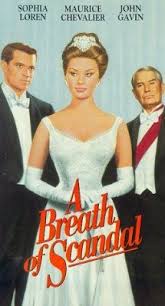
A BREATH OF SCANDAL
US, 1960, 97 minutes, Colour.
Sophia Loren, John Gavin, Maurice Chevalier, Angela Lansbury, Milly Vitale.
Directed by Michael Curtiz.
A Breath of Scandal is a piece of '50s entertainment fluff. It was based on a play by Ferenc Molnar, the author of The Swan, which was effectively filmed and publicised at the time of Grace Kelly's wedding to Prince Rainier. This film boast the presence of Sophia Loren, although she was at the beginning of her international career and there was emphasis on her being a sex symbol. She seems to enjoy the opportunity for comedy and elegance. Her lead is a stolid John Gavin (who was to portray Cary Grant in the telemovie biography of Sophia Loren). There is entertaining support from Maurice Chevalier, Isabel Elsom and Angela Lansbury. Sets are colourful, the period is pre-World War One and has that rather antiquated look associated with The Swan and The Prince and the Showgirl. Direction is by veteran Michael Curtiz at the end of a prolific career. Pleasantly inconsequential entertainment.
1. The appeal of this kind of romantic comedy? Historic situations with the fairytale touch? The touch of reality with reference to the United States, cars and money? The appeal of the film in its time? Later?
2. Attractive colour photography, European locations, decor and costumes? The musical score?
3. The significance of the title? Sophia Loren as sex symbol at the time? The conventions of the fairytale princess comedy drama? The court? Arranged marriages? Romance and jealousy? Mistaken identities? Happy endings?
4. The plausibility of the plot - the doings of princes and princesses in those days? The initial accident, Olympia's encounter with Charlie, his not knowing her identity, his mission in Europe, the encounter with Prince Philip, the discovery of the truth, Olympia's love and the arranged marriage, her trying to put Charlie off, the weekend, the final happy ending? The subplot of marital intrigue? The comic touches?
5. Sophia Loren's style as Olympia? Glamour, dignity, prestige? Sex symbol - Romantic? Doing her duty as princess? Love for her father and protecting him? Her putting Charlie off? Her finally going with him?
6. John Gavin as the typical handsome stolid American hero? His gallantry, falling in love, business deals, not understanding the intricacies of European diplomacy? The outings with Olympia? His worry about reputation, especially with Prince Philip? The marriage and making Princess Olympia Mrs. America?
7. Maurice Chevalier as the prince? His official duties? His love for his wife and his fidelity and the irony of taking out his lieutenant's lady love? His wisdom in helping Olympia? Her mother and the fussing about the wedding? Protocol? The opinion of the Emperor? The rivalry with Lina?
8. Lina and Angela Lansbury's style as schemer, catty aristocratic woman? Her husband? Her infatuation with the prince? Jealousies toward Olympia? Snooping and intrigue?
9. The supporting characters in the court - officials, the lady love entertained and sung to by Prince Philip? The villagers?
10. The pleasant comedy of mistaken identity and romance? Court sequences, audiences, balls etc? The happy ending? Audience response to perennial love themes?
Published in Movie Reviews
Published in
Movie Reviews
Tagged under
Saturday, 18 September 2021 19:45
Brian's Song
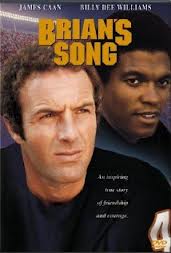
BRIAN'S SONG
US, 1970, 75 minutes, Colour.
Billy Dee Williams, James Caan, Jack Warden, Judy Pace, Shelley Fabares.
Directed by Buzz Kulik.
Brian's Song has the old value of heart-warming sentiment to the fore in a humane story of two footballers, one black, one white, who become friends and show us what fine friendship can mean. James Caan is an engaging actor and is at his best here, matched well by Billy Dee Williams. They both carry off emotional scenes well and are convincing on screen, blending humour and sadness. Don't be put off if you feel you are not a football fan. The human story is what counts. The film is not just a tear-jerker; it is a film that could genuinely move you to tears. It is only short, but telling.
1. The meaning of the title: Brian singing as payment for his tripping his friend, Brian's swansong, his achievement before his death?
2. The principal impact of the film? Did you feel the audience became very involved? Did it respond to the sentiment of the film? (Was the film sentimental at all?) How humane a film was this? What principal human values did it propose? What audience response did it presuppose? What were its principal messages? How important was the friendship theme.
3. Comment on the narrative use of the film. Did this give it a self-documentary style? How much of the games material was authentic? Did this add to or take away from the film?
4. Did you like Brian Piccolo? Was he meant to be a likable character? Our first meeting of him at football: his sense of humour? what kind of man was he in himself? How happy a person? How good a footballer? The fact that he had always come second? His ambition to do something worthwhile and come first? His capacity for helping, even though with practical jokes? The fact that he was chosen to share a room with a negro? His friendship during his friend's illness? His challenging a man back to life? How shocking was the news of Brian's illness? How did you feel during this illness in the hospital sequences? The emotional impact of his death?
5. Brian's friend: did you like him? Why was he so shy? How talented a person was he? How well did he relate to Brian? Why? How important for the film was it that he was a black? The racial theme and his sharing a room with Brian? His talent as a footballer and coming first? His response to Brian's challenges in getting well again? His support for Brian in his illness? His speeches of loyalty and praise for Brian? How good a friend was he?
6. How well was the football world presented in the film? How important an environment for the friendship and understanding of the two men? The amount of film devoted to training programmes, to excerpts from the games, to the comradeship of the teams and the club, the rules of the club, the various rivalries, the joys of winning, etc.?
7. What contribution did the coach make to the lives of these two men? Did he see the good in them and draw it out of them? The coach as a typical American footballing coach? Comment on his style of getting a performance out of people. His attitude to the racial question and his asking Brian and his friend to participate?
8. The wives were introduced only by accident. Were they attractive women? Did the two men have happy marriages? Did the wives get on well as friends also? What did the friendship of the two men contribute to the success of their marriages?
9. How well did the film present the two illnesses and parallel them? How did it show that each helped the other for recuperation? Brian's challenge to his friend to make him run? The friend's helping Brian in his death?
10. How moving were the sequences of the annual dinner, the trophy giving and Brian dying? What truth was told in the friend's speech?
11. What is the effect of this kind of film? Does it merely jerk tears or does it move the heart? Why? How valuable is a film like this?
Published in Movie Reviews
Published in
Movie Reviews
Tagged under
Saturday, 18 September 2021 19:45
Bride, The
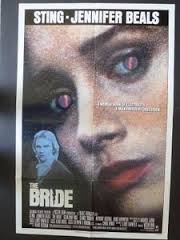
THE BRIDE
US, 1985, 114 minutes, Colour.
Sting, Jennifer Beals, Anthony Higgins, Geraldine Page, Alexei Sayle, Quentin Crisp, Veruschka, Phil Daniels.
Directed by Franc Roddam.
The Bride is an '80s remake of The Bride of Frankenstein, freely adapted. It was directed Franc Roddam, director of Quadriphenia and The Lords of Discipline.
The film has unusual casting. Sting is as diabolical as ever as Charles Frankenstein. Jennifer Beals, of Flashdance, is Eva the bride. However, while the familiar material from the Frankenstein stories is presented, the focus of the film is very much on the monster, a very sympathetic performance, and his dwarf friend Rinaldo, David Rappaport. The film intercuts between Frankenstein and the bride and the life at the carnival with the monster, named Victor, and Rinaldo.
The film has the atmosphere of the Hammer Studios horror films, with a bigger budget. The film is an enjoyable variation on the Frankenstein theme. It has an atmospheric, romantic musical score by Maurice Jarre.
1. The popularity of horror films? The traditions of the horror film? A remake in the '80s? Derivations? Comparisons?
2. The popularity of the Frankenstein story, Mary Shelley's novel, the 19th. century tradition, the film traditions?
3. British production values: location photography, the 19th century, the laboratories and castles, the towns, carnivals? Beauty and ugliness? Good and evil? The special effects, explosive, violent? The romantic musical score?
4. Audience familiarity with the story and the characters, attitude towards Frankenstein, his work, the monster, the bride? The myths of horror stories ? science and religion, playing God, diabolical games? The power of life and death?
5. Sting as Frankenstein: presence, appearance, smooth but arrogant, his assistant and his death, the bride and the experiment, the electricity, the cosmic upheaval and the experiment out of control, the breaking of the machinery, the fire? The irony of the bride coming to being? The contrast with the monster and his being ousted from the laboratory?
6. The bride and her beauty, the success of the experiment? Her needing to learn everything. developing, educating by Frankenstein (a variation on the Pygmalion story)? The story. her being a cultivated lady, her place in society? Her own puzzles, the riding, the encounter with the monster. the confrontation with Frankenstein, the final reconciliation with the monster? The Pygmalion and Beauty and the Beast themes?
7. Frankenstein and his position in society, friends? His hold over the monster, his hold over the bride? His plans for her, his lust? Telling the truth to her? The revelation of the laboratory? The build-up to the confrontation with the monster. the fire and his death?
8. The film's focus on the monster as a character: his presence during the storm. the bride's rejection of him as ugly, Frankenstein's ousting him from the castle? His wandering, hunger, the encounter with Rinaldo? Walking with him, carrying him? Going to the city? The carnival, his proving his strength by hitting the peg? His care for Rinaldo, the bond of friendship, catching him in the tent, being a clown in the performance, the audience acclaim, his delight, Rinaldo's death and his grief, the Medal of Venice? The gradual humanising of the monster? His sharing by telepathy the experiences of the bride, and vice versa? His being hounded by the carnival people? His return? Helping Eva, the grief because of her rejection of him, the buying of the jewels from the tinker, his childlike simplicity, the return to the castle, the confrontation with Frankenstein, the fear of fire, the fight, Frankenstein's death, the reconciliation with the bride? The visit to Venice? The variation of the monster theme by humanising him?
9. Rinaldo as a character, personality, dwarf, meeting the monster, naming him Victor. eating the chicken,. sharing, educating the monster, helping to humanise him? Brains and brawn forming one person? His being carried? The carnival, the interviews, his shrewdness, the manager, Bela, the performance and his tricking the manager, enjoying his performance,, Victor being part of the act. the money demands, his being a victim, falling, the pathos of his death. giving victor the medallion? The superimposition of his face at the end?
10. 19th century society. elegance and decadence, seductions? The shock about the behaviour of Frankenstein? Standards and double standards?
11. The carnival, the manager and his meanness, gruffness, Bela and his being in the background, quiet, sinister? The influence of the manager in cutting Rinaldo's rope? The persecution by Victor, the brutality of his death? The frenzy of the carnival people and their persecuting Victor?
12. The intertwining of the two stories and their effect?
13. The blend of horror and elegance? A fable about power. science, religion, life and death?
Published in Movie Reviews
Published in
Movie Reviews
Tagged under
Saturday, 18 September 2021 19:45
Bride By Mistake
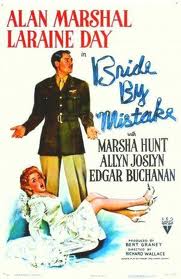
BRIDE BY MISTAKE
US, 1944, 81 minutes, Black and white.
Laraine Day, Alan Marshall, Marsha Hunt, Alan Joslyn, Edgar Buchanan.
Directed by Richard Wallace.
Bride By Mistake is a pleasant romantic comedy. It is obviously wartime propaganda and morale-boosting, representative of so many small-budget short-running features of the time.
It was directed by Richard Wallace, director of many pleasant films including The Little Minister, The Young in Heart. Lorraine Day is a pleasant if unexciting heroine, Marsha Hunt has more verve in the supporting lead role. Leading man is Australian-born Alan Marshall who had roles in such films as The Hunchback of Notre Dame, Lydia, The White Cliffs of Dover. There is entertaining support from Alan Josslyn and Edgar Buchanan.
The film's screenplay is based on a story by Norman Krasna and is written by Henry and Phoebe Ephron. Laraine Day plays a millionairess who wants to find the right husband. Her friend Sylvia (Marsha Hunt) married to Philip (Alan Josslyn) takes her place until Nora finds the right man. Needless to say he is Alan Marshall. The film shows the war background, officers resting at a luxury hotel. There is a pleasant blend of mistaken identity and usual romantic comedy routines. There is plenty of sentiment with a wedding.
While the material is familiar, there is a pleasant sharpness at times in the screenplay and in the performances which make it a little better than merely routine. It offers a variation on the American dream, marrying money and success, but with the humorous unreality of the '30s screwball comedies.
Published in Movie Reviews
Published in
Movie Reviews
Tagged under
Saturday, 18 September 2021 19:45
Bride Comes Home, The
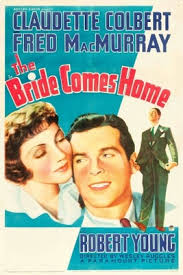
THE BRIDE COMES HOME
US, 1935, 82 minutes, Black and white.
Claudette Colbert, Robert Young, Fred Mac Murray, William Collier, Donald Meek.
Directed by Wesley Ruggles.
The Bride Comes Home is not exactly a film people would spend a lot of time discussing. However, it is one of those 1930s romantic screwball comedies which has a lot of conventional material but was quite well handled at the time and gives a good impression of the particular genre. While the film is set in the Depression and in Chicago, the focus is on the wealthy. Claudette Colbert, fresh from her Oscar winning performance in It Happened One Night, is the penniless socialite who helps the millionaire played by Robert Young in a daffy kind of way, because she needs a job. Fred Mac Murray is his bodyguard who moves to the editing of a magazine backed by Young. There are a lot of expected situations, mockery of the rich, praise of the hard workers. There are marital mix ups as Claudette finds that she has fallen in love with Fred, clashes with him and seeks refuge with Robert. There is one of those breathless climaxes as Robert and Claudette are about to get married as Fred and Claudette's father rush to the scene on a motor bike. The material is particularly American as is the style. It is the perennial material of the battle of the sexes, romance, work, careers. All discussible material but this is done in the screwball fluffy vein.
Published in Movie Reviews
Published in
Movie Reviews
Tagged under
Saturday, 18 September 2021 19:45
Bride Wore Black, The
THE BRIDE WORE BLACK
France, 1967, 107 minutes, Colour.
Jeanne Moreau, Jean-Claude? Brialy, Michel Bouquet, Claude Rich, Charles Denner.
Directed by Francois Truffaut.
The Bride Wore Black is Truffaut's homage to Hitchcock. In the mid-sixties Truffaut interviewed Hitchcock for days and the book of their interviews was published and received very well. Truffaut takes crime themes and works on suspense rather than mystery, as does Hitchcock. This is a story of vengeance gradually revealed to the audience as a bride whose husband is accidentally killed takes revenge on the five men responsible for his death. Each of the vengeance sequences is most stylishly done creating great atmosphere and audience interest.
Jeanne Moreau is very effective as the bride sworn to vengeance. A gallery of French actors enact the parts of the victims very well indeed. Truffaut also uses colour, especially alternating costumes of black and white, for his avenging heroine. The next film that Truffaut made was The Mississippi Mermaid from a novel by the same author as The Bride Wore Black. The two could be well compared in discussing themes of guilt and responsibility, good and evil, appearances and reality.
1. The quality of this thriller? From a director such as Truffaut? His interest in and influence by Hitchcock? Similarities and differences?
2. The impact of the film as entertainment? As a fable about revenge and guilt and responsibility?
3. The importance of colour, French locations? The different atmosphere about Julie and her presence to each of her victims? The contrast with the wedding ceremony and its repetition? (The lyrical memory of her childhood?) The score by Bernard Herrmann with his Hitchcock associations?
4. The visual presentation and her different styles, the avenging personality, even to Diana the huntress? The alternating of black and white costumes? Her presence at the marriage ceremony and the build-up of detail about the ceremony through each memory?
5. Jeanne Moreau's presence as Julie? Initial puzzle as she tried to kill herself? Horror at the death of the first victim? Audience, sympathy, antipathy? The importance of the confession sequence? The fact that she seemed to have no feeling or that it had been deadened? Her reaction to the death of each of her victims? The importance of the fact that she did explain the situation to Morane? Was this for the person or for the third victim at this stage of the film? Fergus's response to her and drawing the unknown portrait? Julie as a real character? As a symbol of avenging and exterminating angel?
6. The atmosphere of suspense, puzzle? The build-up to audience interest in and involvement in the murders of the victims and sharing her vengeance?
7. The importance of showing the explanation only in the middle? The men themselves as we knew them from their deaths? Their playing cards, drinking the reaction with the rifle, the accident of the death and their decision to escape and not meet one another? Their irresponsibility and heartlessness? Did they deserve their deaths?
8. The killing of Bliss and the initial atmosphere? Julie's arrival at the hotel, the party, the chatter between the men, Corey and Bliss? Bliss's behaviour at his engagement party? The build up to his murder with the scarf and his reaching for it? His stupidity and immediate infatuation causing his death?
9. The transition to Coral and his room as revealing himself? As a type? Bachelor and a preoccupation with sexuality? The encounter with Julie and his invitation? His deference in improving his room? The violence of his death? And Julie's comment to him? Her explanation of reasons?
10. The long emphasis given to the Coral family? The importance of Julie's encounter with the little boy and the more humane aspects of her behaviour? The telegram, her return, dinner and Coral's behaviour? The games? The involvement of Morane in searching for the ring and his death? Her continuing vengeance as she locked and taped him in even while telling her story? The importance of her ringing to let the teacher off suspicion? Audience reaction to the danger of the framing of the teacher and the interrogation of the little boy?
11. The transition to the world of Fergus, his art, his work with Julie and paying off the model? His secret painting? The fact that we did not see his death but discovered him dead? The effect of Julie's discovery of the painting?
12. Delvaux at the garage, the irony of his being arrested before Julie could kill him? Corey and his suspicions? The importance of the funeral sequence and Julie being so noticeable with the veil? The build-up to her arrest, the irony of her wanting to be in prison? The screenplay's doubling of the serving of the meals and the build-up to the final scream? An appropriate ending?
13. What insights into human nature through this thriller? Death, life, justice and vengeance?
France, 1967, 107 minutes, Colour.
Jeanne Moreau, Jean-Claude? Brialy, Michel Bouquet, Claude Rich, Charles Denner.
Directed by Francois Truffaut.
The Bride Wore Black is Truffaut's homage to Hitchcock. In the mid-sixties Truffaut interviewed Hitchcock for days and the book of their interviews was published and received very well. Truffaut takes crime themes and works on suspense rather than mystery, as does Hitchcock. This is a story of vengeance gradually revealed to the audience as a bride whose husband is accidentally killed takes revenge on the five men responsible for his death. Each of the vengeance sequences is most stylishly done creating great atmosphere and audience interest.
Jeanne Moreau is very effective as the bride sworn to vengeance. A gallery of French actors enact the parts of the victims very well indeed. Truffaut also uses colour, especially alternating costumes of black and white, for his avenging heroine. The next film that Truffaut made was The Mississippi Mermaid from a novel by the same author as The Bride Wore Black. The two could be well compared in discussing themes of guilt and responsibility, good and evil, appearances and reality.
1. The quality of this thriller? From a director such as Truffaut? His interest in and influence by Hitchcock? Similarities and differences?
2. The impact of the film as entertainment? As a fable about revenge and guilt and responsibility?
3. The importance of colour, French locations? The different atmosphere about Julie and her presence to each of her victims? The contrast with the wedding ceremony and its repetition? (The lyrical memory of her childhood?) The score by Bernard Herrmann with his Hitchcock associations?
4. The visual presentation and her different styles, the avenging personality, even to Diana the huntress? The alternating of black and white costumes? Her presence at the marriage ceremony and the build-up of detail about the ceremony through each memory?
5. Jeanne Moreau's presence as Julie? Initial puzzle as she tried to kill herself? Horror at the death of the first victim? Audience, sympathy, antipathy? The importance of the confession sequence? The fact that she seemed to have no feeling or that it had been deadened? Her reaction to the death of each of her victims? The importance of the fact that she did explain the situation to Morane? Was this for the person or for the third victim at this stage of the film? Fergus's response to her and drawing the unknown portrait? Julie as a real character? As a symbol of avenging and exterminating angel?
6. The atmosphere of suspense, puzzle? The build-up to audience interest in and involvement in the murders of the victims and sharing her vengeance?
7. The importance of showing the explanation only in the middle? The men themselves as we knew them from their deaths? Their playing cards, drinking the reaction with the rifle, the accident of the death and their decision to escape and not meet one another? Their irresponsibility and heartlessness? Did they deserve their deaths?
8. The killing of Bliss and the initial atmosphere? Julie's arrival at the hotel, the party, the chatter between the men, Corey and Bliss? Bliss's behaviour at his engagement party? The build up to his murder with the scarf and his reaching for it? His stupidity and immediate infatuation causing his death?
9. The transition to Coral and his room as revealing himself? As a type? Bachelor and a preoccupation with sexuality? The encounter with Julie and his invitation? His deference in improving his room? The violence of his death? And Julie's comment to him? Her explanation of reasons?
10. The long emphasis given to the Coral family? The importance of Julie's encounter with the little boy and the more humane aspects of her behaviour? The telegram, her return, dinner and Coral's behaviour? The games? The involvement of Morane in searching for the ring and his death? Her continuing vengeance as she locked and taped him in even while telling her story? The importance of her ringing to let the teacher off suspicion? Audience reaction to the danger of the framing of the teacher and the interrogation of the little boy?
11. The transition to the world of Fergus, his art, his work with Julie and paying off the model? His secret painting? The fact that we did not see his death but discovered him dead? The effect of Julie's discovery of the painting?
12. Delvaux at the garage, the irony of his being arrested before Julie could kill him? Corey and his suspicions? The importance of the funeral sequence and Julie being so noticeable with the veil? The build-up to her arrest, the irony of her wanting to be in prison? The screenplay's doubling of the serving of the meals and the build-up to the final scream? An appropriate ending?
13. What insights into human nature through this thriller? Death, life, justice and vengeance?
Published in Movie Reviews
Published in
Movie Reviews
Tagged under
Saturday, 18 September 2021 19:45
Bridge at Remagen, The
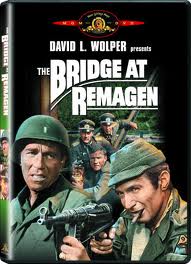
THE BRIDGE AT REMAGEN
US, 1969, 116 minutes, Colour.
George Segal, Robert Vaughn, Ben Gazzara, Bradford Dillman, E. G. Marshall, Anna Gael. Peter van Eyck.
Directed by John Guillermin.
The Bridge at Remagen is an average war adventure concerning the attempts to save and to destroy the last bridge over the Rhine in 1945. It was the last means of escape for German soldiers retreating from France. It was an entry for the Americans into Germany. The preservation of the bridge was an important question. Should it be destroyed by the Germans to stop the Americans (with the risk of isolating their own soldiers in France) or should it be preserved for a short time by the Germans to rescue their men (with the risk of the Americans taking it undestroyed).
The film is full of spectacular action photography as it crosscuts from the small, exhausted American units who are ordered to get to the bridge, to the defending Germans commanded by a man who wants to leave the bridge standing as long as possible but suddenly finds the Americans there. While it is an action film, there are several nods in the direction of antiwar feeling and the terrors of war suffering and death. The American heroes are not presented sympathetically.
1. The strategic importance of the bridge, for the Germans; for the Americans?
2. The motives of the two German officers who wanted the bridge preserved for as long as possible and whether their intentions were realistic?
3. The presentation of the Americans, tired, war-weary, heroic, pawns in superior officer's plans; unsympathetic, especially Angel and his looting, the major and his readily putting his men into action to make a good impression?
4. The presentation of the Germans, conventionally unsympathetic, highlighting of the role of the major, played by Robert Vaughn, as a humane man, (and his contrast with the inarticulate hero, played by George Segal)?
5. Was this film anti-war in feeling?
6. Did the film show civilians as victims of war, the town bombings, the people on the bridge, the hotel man's family?
7. Did the hard American major (Bradford Dillman) have the right to ask the unit to defuse the bridge and endanger themselves?
8. What is the importance of authority, discipline and obedience in war, especially when individuals do not know the full picture? Even though Segal and Vaughn do not meet in the film, Segal has Vaughn's cigarette case at the end after taking it from a dead friend.
9. The film implies a link between the American and the German. Did this come through in the film?
10. Why was the German major executed? What impression did this scene make?
Published in Movie Reviews
Published in
Movie Reviews
Tagged under
Saturday, 18 September 2021 19:45
Bridge of San Luis Rey, The
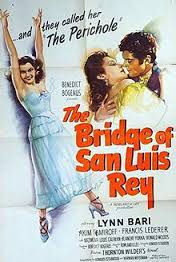
THE BRIDGE OF SAN LUIS REY
US, 1944, 85 minutes, Black and White.
Lynn Bari, Francis Lederer, Nazimova, Louis Calhern, Akim Tamiroff, Blanche Yurka, Donald Woods.
Directed by Rowland V. Lee.
The Bridge of San Luis Rey is an adaptation of Thornton Wilder's Pulitzer Prize winning novel. It is not a particularly successful adaptation, especially in comparison with Sam Wood's 1940 film version of Wilder's play, Our Town. The production looks very much a 'B' production. However, the interiors of 18th century Peru are lavish and also the costumes. The acting, however, is not particularly persuasive except for Akim Tamiroff's performance as Uncle Pio. The silent actress associated with Valentino, Nazimova, also has an interesting role as the Marquesa. The structure of the film seems rather awkward and melodramatic and much of the action is talkative and even seems stilted. However, it is an opportunity to understand something of Wilder's insight into providence and the meaning of life and death. Direction is by Rowland V. Lee, noted for his historical and costume melodramas especially the Robert Donat Count of Monte Cristo.
1. The reputation of the novel, its adaptation and transference to the screen? Wilder's participation in the screenplay? The prize-winning status of the novel? Its impact in the '40s, now?
2. The quality of the production? The re-creation of the period, costumes and decor? How convincing a presentation of Peru and its society in the 18th century? The status of the stars?
3. The importance of the structure: the discussion about providence, the collapse of the bridge without the audience seeing who died? The reaction to deaths on a bridge? Curiosity as regards the five who died? Sharing the curiosity and the religious question with the friar? The investigations? The understanding of the various characters? The build-up to the collapse of the bridge? The ending?
4. The film as a fable about life, death, its meaning? God and providence? The narrative of the friar, the explanation of Peru in 1774? The discussions and interrogations?
5. The portrait of the friar, the motivation for his search, the religious questions he couldn't answer? The audience sharing these? How much insight did he gain in writing down the story? Did the audience share this insight?
6. The focus on Uncle Pio? The audience observing him as a popular man in Lima, the range of his contacts, his style with the poor, with the wealthy e.g. as regards the play, his contacts with the Viceroy himself? His devotion to Michaela, his taking her from singing in the streets, the presentation of the way that he trained her and the montage of how difficult it was for her with so much practice? His success with her? His setting her up in the theatre, his hardness towards her? His ingratiating himself always with the Viceroy, his covering up for Michaela's absence? Her decision to leave him and its effect on him? His continued interest in the city, in furthering his own cause? The importance of his attitude towards Manuel, arranging his escape, manipulating the Viceroy into pardoning him? His being left alive on the edge of the bridge and his puzzle as to the reason for God's letting him live? How well observed a character?
7. Michaela as heroine, the vivacity of her singing in the streets, getting money? Her ambitions, the long hours of being coached? Her ultimate success? Love for Manuel, the jealousy of Estaban? Her promise of fidelity to Manuel? The attentions of the Viceroy and her warding these off? Her going to the palace, her becoming a fashionable lady, the attitude of the people at the palace, the false friendship of the Marquesa? Her being insulted, yet trusting the Marquesa? The importance of the bond with the Viceroy, her fidelity to Manuel? Manuel's return and her going off with him? Estaban and the revelations and her disillusionment? The insulting song, the Viceroy's asking her to repent and her doing this? Her change in pride, the Marquesa's repentance? Her hopes for Manuel, deceiving the Viceroy? Her being on the verge of the bridge and not dying? How well observed a portrait?
8. The character of the Viceroy? His Spanish background, his code, his ruling of the colony? As a man, as an entertainer. his attitude towards his subordinates? His boredom with his guests, drinking and discussing with Pio? His patronising the arts and especially Michaela? The tensions at the dinner, his going to the theatre to apologize ? and Michaela's artificial fainting? His lavishing gifts on her? His reaction to the insulting song, demanding her apology? His proposal of marriage and her warding it off? His granting Manuel's pardon after the confrontation and the possibility of Manuel killing him? His return to Spain, his interpretation of the bridge tragedy? A portrait of a type?
9. The Marquesa and her ambitions, her good manners, her charm, her plans for her daughter. the pseudo-friendship, the insulting song, her maid and her prayer and converting the Marquesa, her repentance and her death?
10. Manuel as hero, his extrovert nature, the sailor, his returns, his reaction to Estaban's attempted suicide, his devotion to Michaela, the confrontation with the Viceroy and not killing him., the arrest and the escape, the happy ending?
11. Estaban as twin brother,. his sense of his brother's presence, jealousy towards Michaela, the writing of the letters, his decision to betray the Marquesa, his dying on the bridge?
12. The maid and her fidelity, her piety, her influence on the Marquesa, her death?
13. The significance of the Indian and his talk to the friar about providence and his dying on the bridge?
14. The background of Spain and its colonies, Peru? Culture, colonialism? Power, society, religion?
15. How significant the theme of death and the meaning that it gives to people's lives? Providence and the fact that people can change so often? Appearances and reality?
Published in Movie Reviews
Published in
Movie Reviews
Tagged under
Saturday, 18 September 2021 19:45
Bridges at Toko-Ri, The
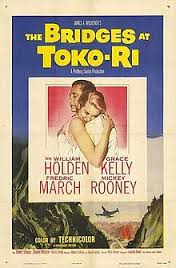
THE BRIDGES AT TOKO - RI
US, 1954, 104 minutes, Colour.
William Holden, Mickey Rooney, Grace Kelly, Fredric March, Robert Strauss, Charles McGraw?, Earl Holliman.
Directed by Mark Robson.
The Bridges At Toko - Ri was a popular Korean war film of the '50s. William Holden had just won an Oscar for Stalag 17 and was at the height of his popularity. Grace Kelly won an Oscar for Country Girl this year. Fredric March was a popular character actor at this stage of his career. The human interest and morale boosting discussions about America's involvement in Korea in the situation of the cold war is highlighted. There are also some good action sequences with the bombing of the bridges.
The film is unusual in having its hero die at the end and morale points made about this death. The film was based on a story by James A. Michener, author of Hawaii, Tales Of The South Pacific, The Source and other novels. Direction is by Mark Robson, a director competent in a variety of genres from horror in the early '40s to emotional dramas in the late '40s and early '50s, the filming of popular best-sellers as Peyton Place, The Valley Of The Dolls and also of a number of action films. The film is well made and thoughtful. It echoes the questions and reflections about America's place in the world and its stance against communism.
1. The war film tradition, American supremacy, reasons for involvement in wars, overseas action, questions of morale, morale boosting, war action? The quality of this film within this context?
2. The atmosphere of the Korean war at the beginning of the '50s ? the cold war, the atmosphere after World War Two, alliance with the Japanese, hostility towards the Russians? American involvement and the questions about involvement?
3. Morale, the presentation of the men, the tribute at the beginning of the film, the views of the Admiral about World War Two. the death of his sons, his final admiration for Harry and his reflections on heroic ordinary American men? The Admiral's discussion with Nancy and his explanation of his own wife's failure to cope with deaths? Harry and his letter home to Nancy? The impact of the final speech?
4. The presentation of the action and missions, the initial mission, ditching in the sea, the details of helicopter rescue, recuperation on the ship, briefings and strategy, photographing raids, the actual bomb raids and their difficulties, crash landing, self defence? The quality of aerial photography? An understanding of war and immersion in it?
5. The presentation of the ship, the Admiral and his running of the ship, the discussion about promotions and expectations of officers, especially as regards Lee? The various exercises of leadership, from the Admiral, to the briefing officers, to Lee and his decisions?
6. The personality of the Admiral, his meeting Nancy, the story of the deaths of his own sons, his wife's collapse? His advice to Nancy? His admiration for Harry and protectiveness? His final comments?
7. The lighter side with Nestor and Mike? Their ability to save and rescue, the discussions about the girls in Japan, the long brawl, Harry getting them out of jail and paying the fine, the fight on the dock, the transfer, their deaths in the rescue of Harry? The praise of such ordinary men, the types who didn't fraternise with admirals?
8. Harry Brubaker as a type, William Holden's presence and personality? His skin in the raids, his Denver background. his wondering finally about being in a dirty ditch in Korea? The meeting with Nancy, leaving for Mike? The discussion in bed about the bridges and the importance of saying this and Nancy hearing it? The humorous sequence in the Japanese baths? The friendship with the Japanese family? Nerves and going to the edge of the ship for getting the spray in his face? His achievement in the raid? Skill in landing, his death? The film's comment by having the hero die? Nancy and Grace Kelly's presence? The discussion with the Admiral, voicing the feelings of the American wives, the discussion with her husband and knowing the truth? The farewell?
9. The war atmosphere, life on the ship, the work on the ship. Beer Barrel and his comic tones, skills, the crash landing on the deck?
10. The missions and their importance for the fighting of the war? Fight and survival? A war film of its time? Echoing the questions of the '50s ?their relevance in later decades, especially about Americans at war in Asia?
Published in Movie Reviews
Published in
Movie Reviews
Tagged under
Saturday, 18 September 2021 19:45
Bridge to the Sun
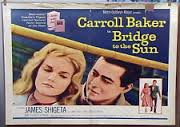
BRIDGE TO THE SUN
US, 1960, 114 minutes, Black and White.
Carroll Baker, James Shigeta.
Directed by Etienne Perrier.
Bridge to the Sun is a moving story of a marriage between an American woman and a Japanese man in the mid-30's and their lives during the war in Japan itself. The film is based on fact and has a genuine air about it that makes it a human document about love and marriage, race and custom, questions and war, and should provide excellent and thought-provoking entertainment for all audiences.
1. What did the title mean in terms of Japan, the U.S. and the marriage and the child?
2. Was the symbol of the touching hands appropriate for the credits? What atmosphere did it give to the film? Was this just a conventional story with a touch of the fairy tale about it? Or did it seem to you a genuine story based on true events? Why?
3. Did the film build up the atmosphere of the 30's with the Washington diplomatic scene, the suspicions of the Japanese, the Americans' belief in themselves?
4. Why did Gwen fall in love with Terry? Did the film make it clear that they genuinely loved each other? How?
5. What did Gwen and Terry have in common? How convincing were their courting sequences? How important throughout the film was the race issue?
6. Why did a Japanese/American marriage seem repugnant to people because of difference in race, culture, manners? How important were the political tensions of the late 30's for arguing to stop the marriage?
7. Did Gwen and Terry face these issues realistically?
8. Did Gwen understand enough of Japanese manners and customs before she married? How did the film show, in small details, her lack of awareness, e.g. the place of men before women in Japan?
9. Why did she react against the way Japanese men put women in their place? Was she justified? or was she trying to impose her American ideas readily on others?
10. What did each of them have to surrender to make the marriage a success? Did they?
11. How did the war, ideologies. and politics affect each of them and their marriage? Was U.S. hostility to the Japanese officials justified? To the wives. including Gwen? Did she make the right choice in returning to Japan?
12. How did she suffer equally in Japan? Was Japanese suspicion of and hostility to her justified?
13. How did she use her daughter as a focus of hostility and as a focus of reconciliation; 'a bridge'?
14. Were the dangers and hardships of war realistically portrayed the raids, suspicion, hunger, flight, secret work, betrayals? Was the film anti-war or neutral in its attitudes?
15. Did Terry do the right thing during the war? Why?
16. Was Jiro's offer to Gwen to be another Tokyo Rose important to Gwen? Why?
17. What effect on the audience did the scenes of American Gwen being bombed by U.S. planes have? How strongly anti-bombing were these sequences?
18. How happy was the end of the war ? from Gwen and Terry's point of view? From the Japanese point of view, considering Hiroshima?
19. How sad was Terry's death? Was it well handled in the film. especially using Japanese customs. the visit to the burial place? What did the death and separation reveal about Terry and Gwen as persons?
20. Do you think this film would contribute to the breaking down of racial discrimination, of war, hatred and itself act as some kind of 'Bridge'? Why?
Published in Movie Reviews
Published in
Movie Reviews
Tagged under